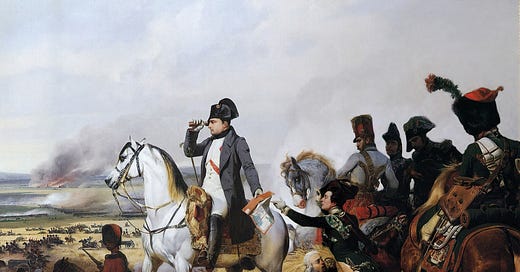Check out my new book (“Napoleon: The Revolutionary Hero”), available on Amazon!
Napoleon led a Europe-wide boycott of British goods, known as the Continental System. But Portugal refused to participate. Together with King Charles IV of Spain, the French invaded Portugal in October of 1807.
But in March of 1808, Napoleon made an unexpected move: his French troops occupied their ally Spain!
Invasion of Spain
The Spaniards did not welcome the French occupation, and led a large-scale revolt on the Second of May. All across the country, Spanish guerrillas harassed French authorities. To restore French control over Spain, Napoleon installed his brother Joseph as the country’s new king.
Unfortunately for France, the British exploited the crisis. Under Sir Arthur Wellesley, the future Duke of Wellington, the British and their Iberian allies pushed out the French troops by August of 1808.
With Joseph Bonaparte unable to restore French control, Napoleon himself personally took command. By December of 1808, Madrid fell back into Napoleon’s hands.
Napoleon’s invasion of Spain had huge effects outside of Europe itself. Spain’s overseas empire in the Americas, which had existed for four centuries, was now being rocked by national independence movements.
Fifth Coalition
With Napoleon distracted in Spain, the other powers of Europe exploited the situation to strike. A Fifth Coalition was organized, starting with Austria’s declaration of war in 1809.
So Napoleon hurried back to France. To keep control over Spain, he left behind an enormous contingent of 300,000 troops.
Battle of Wagram
The mighty Napoleon managed to once again triumph over the European Allies. In July 1809, Napoleon won a costly but decisive victory against the Austrians at the Battle of Wagram, the largest battle in European history up to that point.
Having subdued the Austrians, Bonaparte seized the Papal States, and gifted them to France’s ally: the Kingdom of Italy. Pope Pius VII was outraged, and he excommunicated the French Emperor. In response, angry French officers kidnapped the Pope.
“Spanish Ulcer”
Meanwhile, the war in Spain dragged on. It drained the French Army, bit by bit. So costly was this war to France, Napoleon famously called it his “Spanish Ulcer.”
After years of bitter struggle, Wellesley successfully re-captured Madrid from French hands in 1812. This was terrible news for our hero Napoleon. The myth of his invincibility was beginning to shatter!
Bogged down in Spain, it was the beginning of the end for the French Empire.





